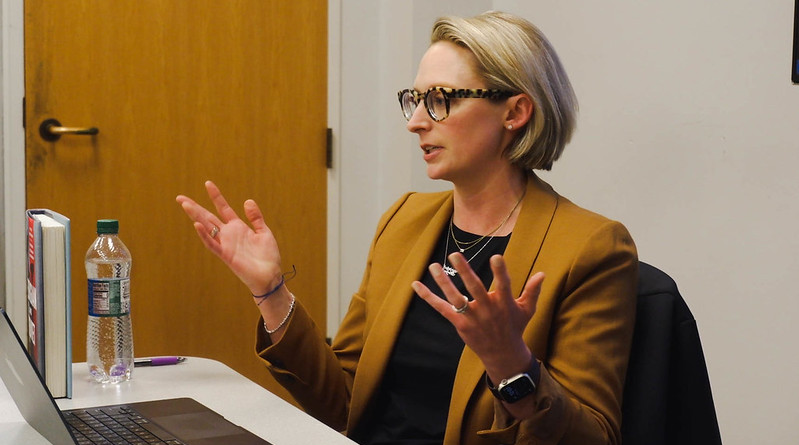The Legacy of Stalin in Georgia and the Caucasus: A Book Talk with Claire Kaiser
By Alex Avaneszadeh, MALD 2023, The Fletcher School
On February 15, 2023, the Fletcher Russia and Eurasia Program hosted Claire Kaiser for a discussion of her new book, “Georgian and Soviet: Entitled Nationhood and the Specter of Stalin in the Caucasus” (2023).
The book explores how the Soviet nation-building process in Georgia and the wider South Caucasus continues to have an impact on perceptions of identity in the country and the region. The rise of Soviet leader Joseph Stalin, an ethnic Georgian, was instrumentalized by Georgian society in various ways. Kaiser explained that “[Stalin] can be looked at as a native son of Georgia or a Russianized supernationalist.”
Kaiser’s research included studying the Soviet Union’s policy toward nationality during Stalin’s tenure as Commissar for Nationalities in the South Caucasus in the 1920s and the political-social relationship between Stalin and Soviet Georgia throughout his rule and afterward.
She used the phrase “entitled nationhood” to describe the status of ethnic Georgians in the Soviet Union, defining it as “the statistical and legal implications of living in your own territory as written on paper, therefore endowing you with special rights and privileges, access to education, and preferential treatment for jobs that the Soviet architecture policy developed.”
In the early 1920s, the Soviet Union was ethnophilic, or highly preoccupied with ethnicity and race. Later, “in the Stalin era, there was a doubling down on a smaller number of what they regarded as more developed nationalities. The resources expended to develop those nationalities was just as extensive as when they were in the era of ethnophilia, making republic-level nations have greater dominance in their own republic,” said Kaiser.
She added that she was also looking at “how Georgians at the local level took these nation-building tools and adopted them, pursuing national agendas that sometimes went along with broader Soviet goals, but in other cases [were] not what Moscow intended,” implying some agency in Soviet Georgian politics.
Stalin’s network in the Kremlin also included other Caucasians. On one hand, he was running the USSR, and on the other, he had a strong interest in what was happening back home in Georgia. What developed in Georgia was a “private vs. public distinction.” In addition to the official cult that was constructed around Stalin, Georgians constructed their own Georgian cult around him, which came to the fore in 1956, three years after Stalin’s death.
In March of that year, “tens of thousands of Georgians protested in Tbilisi against the denigration of Stalin as a national hero…as Kruschev blamed Stalin for the crimes of the 30’s and 40’s and ethnically-based deportation, even though Kruschev operationalized those policies,” stated Kaiser.
The defiant commemoration of Stalin’s death resulted in Kruschev cracking down and killing a few dozen people. This event in Soviet Georgia’s history has not been fully studied. Kaiser explained, “It opened up a real change in the relationship between Moscow and Tbilisi, having important implications for how Soviet Georgia fit into the ethno-territorial configuration in the USSR until 1989.
Today, “Stalin’s ghosts are still very much present in Georgian society, but in ways that are constantly changing,” Kaiser said.
“There continues to be, in certain sectors of the population, real reverence to Stalin for different reasons. There is a generational divide to some extent, and survey data over the past ten years show that people who grew up in the Soviet period continue to believe that Stalin defeated Hitler and were proud that he was a Georgian.” Stalin’s legacy continues to be instrumentalized by sectors of Georgian society, who frame it to fit the narrative they want to support.


